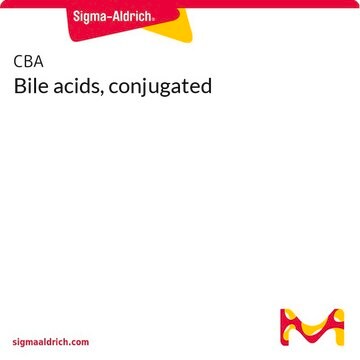C4650
Cholestyramine resin
Synonym(s):
Colestyramine, Dowex 1X2 Cl--Form
Sign Into View Organizational & Contract Pricing
All Photos(1)
About This Item
Recommended Products
form
powder
technique(s)
activity assay: suitable
matrix
polystyrene/divinylbenzene
pH
4—6
capacity
~1.0 meq/g(dry)
Application
Cholestyramine resin has been used:
- as a diet supplement to study the bile acid pool size and fecal bile acid output in mice
- to alter the bile acid (BA) levels and study its effect on liver fibrosis development in wild type (WT), fibroblast growth factor 15 (Fgf15)−/−, and Fgf15 transgenic (TG) mice
- in in vitro digestion process to study the capacity of the fractions for binding bile acid (BA)
Cholestyramine resin is used in protein chromatography, ion exchange chromatography and anion exchange media. Cholestyramine has been used to study the relief of postcholecystectomy diarrhea, the management of intractable cholestatic pruritus and obesity.
Biochem/physiol Actions
Cholestyramine is a cationic exchange resin polymer. This resin is a bile acid sequestrant that interchanges chloride anions for bile acids of the small intestine lumen, leading to excretion of bile acids in the feces and reduced levels of serum bile acid. Cholestyramine is used to treat primary hypercholesterolemia. The resin induces dose-dependent reduction of low-density lipid (LDL) cholesterol. It ameliorates the risk of coronary artery disease.
Other Notes
Quartenary ammonium functional groups attached to cross-linked polystyrene
Legal Information
Storage Class Code
11 - Combustible Solids
WGK
WGK 2
Flash Point(F)
Not applicable
Flash Point(C)
Not applicable
Personal Protective Equipment
dust mask type N95 (US), Eyeshields, Gloves
Certificates of Analysis (COA)
Search for Certificates of Analysis (COA) by entering the products Lot/Batch Number. Lot and Batch Numbers can be found on a product’s label following the words ‘Lot’ or ‘Batch’.
Already Own This Product?
Find documentation for the products that you have recently purchased in the Document Library.
Customers Also Viewed
Guodong Li et al.
American journal of physiology. Gastrointestinal and liver physiology, 305(11), G829-G837 (2013-10-05)
Farnesoid X receptor (FXR, Nr1h4) is a ligand-activated transcription factor belonging to the nuclear receptor superfamily. FXR is essential in maintaining bile acid (BA) homeostasis, and FXR(-/-) mice develop cholestasis, inflammation, and spontaneous liver tumors. The signal transducer and activator
A Psichas et al.
Neurogastroenterology and motility : the official journal of the European Gastrointestinal Motility Society, 24(12), 1095-1101 (2012-08-07)
There is evidence to suggest that the particulate resin colestyramine, a bile acid sequestrant formerly used as a cholesterol-lowering agent, enhances secretion of the gut hormone cholecystokinin (CCK). Established physiological actions of CCK include inhibition of gastric emptying and induction
Carolien Out et al.
Current opinion in lipidology, 23(1), 43-55 (2011-12-22)
Bile acid sequestrants (BAS) have been used for more than 50 years in the treatment of hypercholesterolemia. The last decade, bile acids are emerging as integrated regulators of metabolism via induction of various signal transduction pathways. Consequently, BAS treatment may
Märta K Borghede et al.
European journal of internal medicine, 22(6), e137-e140 (2011-11-15)
The liver produces and secretes bile acids into the small intestine. In the small intestine, most of the bile acids are absorbed in the distal ileum with portal vein transportation back to the liver and resecretion (enterohepatic recycling). Increased spillover
Ju-Ling Liu et al.
PLoS genetics, 8(3), e1002553-e1002553 (2012-03-23)
Mammalian bile acids (BAs) are oxidized metabolites of cholesterol whose amphiphilic properties serve in lipid and cholesterol uptake. BAs also act as hormone-like substances that regulate metabolism. The Caenorhabditis elegans clk-1 mutants sustain elevated mitochondrial oxidative stress and display a
Our team of scientists has experience in all areas of research including Life Science, Material Science, Chemical Synthesis, Chromatography, Analytical and many others.
Contact Technical Service












